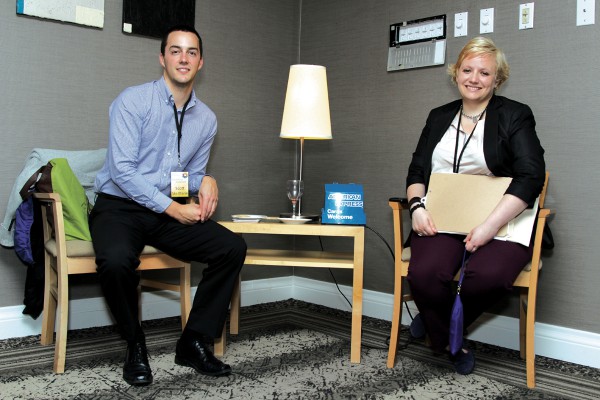The “flourishing campuses” conference focused on campus mental health and student-led initiatives

Scott Ste Marie and Alicia Raimundo at the conference. Raimundo right, is a representative of CICMH and helped organize the event. Photo: Michael Nguyen/The Dialog
“Flourishing campuses” was the theme of the first ever Centre for Innovation in Campus Mental Health (CICMH) conference was held on Nov. 6 and 7 at the Double Tree Hilton hotel in Toronto.
The idea of flourishing needs to be an essential element at post-secondary institutions, according to keynote speaker Corey Keyes, professor of sociology at Emory University.
In order to help students flourish, their accommodation needs must be met, and the majority of the two-day conference revolved around this and that it should, and is being done at different institutions across Canada.
Study results were analyzed, panels were convened, break-out sessions were held, and the diverse audience was represented by students, faculty, disability consultants and administrators from across Canada.
Alicia Raimundo, a representative of CICMH who helped organize the event, helped moderate the “Evaluating Student-led Mental Health Promotion Initiatives,” which generated a fascinating dialogue.
Designed as an interactive session designed for students and others involved in youth-led mental health promotion initiatives that want to learn more about how to design and implement evaluations and mobilize evaluation knowledge to strengthen programs, according to the conference programme, it succeeded in fulfilling this promise.
The Ontario government has been investing a lot of money towards mental health initiatives such as the Mental Health Innovation Fund (MHIF) and at this conference, those who attended got to see the progress being made through a research project being conducted by Dr. Eleanor Condra, former professor in the school of community services at St. Lawrence College, and former faculty liaison for accessibly services.
Currently she is employed as the senior project consultant for the Ministry of Training, Colleges and Universities project “Developing Documentation Standards and Guidelines for Academic Accommodation for Students with Mental Health Disabilities,” funded under the MHIF.
In addition to letting attendees peek at upcoming research results within post-secondary institutions, the conference also held a panel discussion where panelists discussed how their post-secondary institutions were linked to community organizations.
The institutions represented a microcosm of Ontario, one of the panelists being from York University, another from Sault Ste. Marie, which they wryly remarked, “including Sault College, had a population the size of York University.”
Despite the vast disparity in size and resources, the panelists were united in the fact that post-secondary institutions needed to forge links with community organizations.
Lesley Beagrie, a panelist and special advisor to the dean in York University’s faculty of health, and current co-chair of the pan-university mental health steering committee, spoke on forging partnerships saying, “it’s at all different levels of the system, but if you can address connectivity you can win.”
There were big names and impressive organizations that attended the conference, however, the core of the conference was about the needs of post-secondary students.
Nowhere was this more evident than in the panel about peer support on campus where panelists explained the benefits and drawbacks of their four very different approaches on providing peer support on campus.
These peer-support models were from research studies supported by money from the fund, used to pilot mentoring programs to a collective of students who identified as “mad.”

